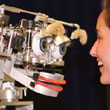robot
 a.k.a. robo, bot, electronic person, robopet
a.k.a. robo, bot, electronic person, robopet An electronic device that can move and react to sensory input. Robots are widely used in factories to perform high-precision jobs, such as welding and riveting, and are also used in special situations that would otherwise be dangerous for humans (for example, cleaning toxic waste or defusing bombs). Robotics refers to the field of computer science and engineering concerned with creating robots; it is a branch of artificial intelligence.
The term "robot" has morphed to also refer to bots, which are automated programs used in several online functions.
Historical perspective: The term was coined by Czech writer Karel Capek back in the 1920's, in R.U.R., a play about technology gone awry (it predicted that robots would ultimately destroy humans).
The first commercial robot firm was founded in 1961 by Joe Engelberger. Many big tech visionaries, including Bill Joy co-founder of Sun Microsystems, have worried aloud that 21st-century robotics and nanotechnology may become so powerful that they can spawn whole new classes of accidents and abuses. As machines become more intelligent, people will let machines make more of their decisions for them," Joy wrote in Wired magazine. "Eventually a stage may be reached at which the decisions necessary to keep the system running will be so complex that human beings will be incapable of making them intelligently. At that stage the machines will be in effective control."
In January 2017, the European Parliament committee approved a resolution granting legal status to advanced robots as "electronic persons" with specific rights and obligations. Have you met Sophia yet?



Edit Word